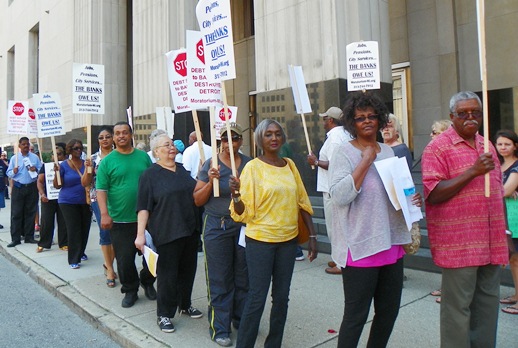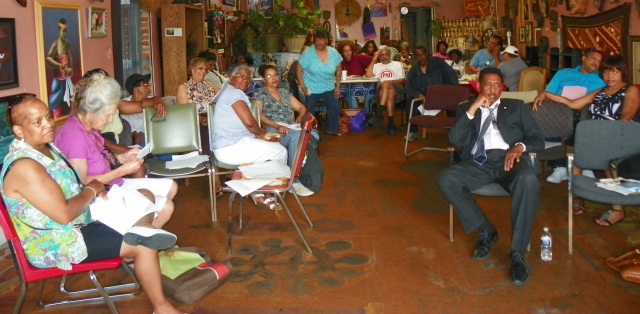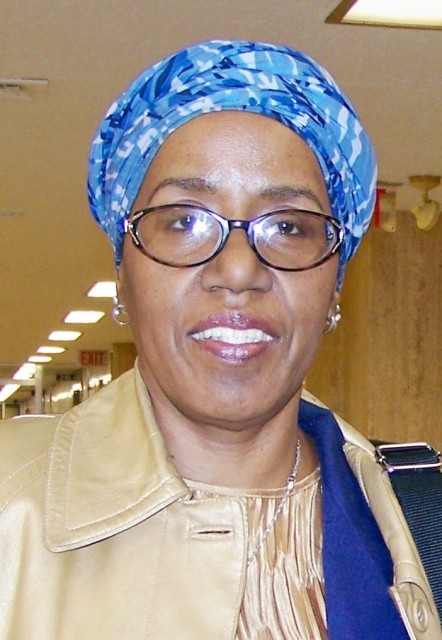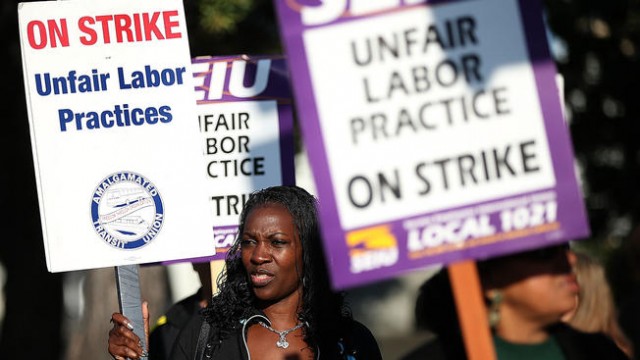DAREA says they have resources to appeal trial outcome if it benefits only banks, not retirees
FGIC, party to infamous $1.5 billion COPS loan, reported ready to settle in exchange for unknown amount, city real estate
Kevyn Orr on COPS loan: “Void ab initio, illegal and unenforceable”
By Diane Bukowski
October 14, 2014
DETROIT – The Detroit Active and Retired Employees Association (DAREA) say they and others will appeal U.S. Bankruptcy Judge Steven W. Rhodes’ final ruling on the Plan of Adjustment if it continues to devastate retirees. As the case stands now, it appears likely only global banks will profit from the POA.
Major creditor and final hold-out Financial Guarantee Insurance Corporation (FGIC), which along with Syncora, Inc. insured the notorious $1.5 billion “Certificates of Participation” loan to Detroit in 2005-06, is reported to be ready to settle by Oct. 16. In exchange, they will get cash from bond issues and large chunks of revenue-producing downtown city real estate.
“We have the resources for an appeal now,” retiree Cecily McClellan told VOD.
“The Objectors to the bankruptcy are being called today to appear in court tomorrow at 8:30 a.m. The lack of notification is to prevent participation, preparation and public awareness. These are citizens without attorneys. We need your support and presence in court Wednesday at 8:30 a.m. in Room 242 of the Federal Building, 321 W. Lafayette.”
Individual objectors, including former Detroit City Councilwoman JoAnn Watson, along with many DAREA members, prepared motions with witnesses and briefs at Rhodes’ command weeks ago, but were not informed exactly when the hearing would be. Rhodes said at the time that he planned to schedule it on the last day of the POA trial.
Jones Day, on behalf of the city, has already filed an omnibus response to the objectors, likely to speed Rhodes’ final decision along.
McClellan noted that drastic cuts to retirees’ pensions and annuities proposed in Detroit’s bankruptcy are now being considered in the California bankruptcy proceedings of Stockton and San Bernadino. Previously, those cities had refused to touch pensions themselves, while at the same time enacting cuts in retiree health care. CalPERS (California Public Employee Retirement System), the largest in the U.S., wielded its clout in hearings to protect pensions.
CalPERS also came to the aid of Detroit, filing an amicus brief with the Sixth Circuit Court of Appeals to support appeals of Judge Rhodes’ bankruptcy eligibility decision by seven Detroit retiree and union entities. All seven have now indicated they will withdraw their appeals if the so-called “Grand Bargain,” $816 million to the retirement systems while the city withdraws its legally obligated payments for at least the next 10 years. Detroit’s retirement systems are worth about $6 billion.
But Stockton bankruptcy judge Christopher Klein, taking a page from Rhodes’ eligibility decision last December, ruled Oct. 1 that California’s public employee retirement law “is simply invalid in face of the U.S. Constitution.” Terming state public pension protections nothing but contracts, as did Rhodes, he said they can be cancelled or modified under the U.S. Bankruptcy Code in order to pay off bankers.
Klein has not actually sanctioned pension cuts yet, because the Stockton bankruptcy has not even reached the Plan of Adjustment stage, although it was filed a year before Detroit’s. Detroit is the only city that filed Chapter 9 bankruptcy under at the command of an unelected Emergency Manager, Kevyn Orr.
Bloomberg News reported that Californians for Retirement Security, a coalition of school teachers, police officers and other public employees, blasted Klein’s ruling. .
“We are disappointed that the judge has sided with Wall Street in a decision that has the potential of devastating citizens, employees, and making bad situations worse,” said Dave Low, the group’s chairman.
The Detroit Free Press reported today that FGIC, after months of closed-door mediation supervised by U.S. District Court of Eastern Michigan Chief Judge Gerald Rosen, is ready to reach a deal by Oct. 16, 2014.

- Joe O’Keefe of Fitch Ratings smirks as Stephen Murphy of Standard & Poor’s presses disastrous $1.5 BILLION COPS loan on Detroit City Council Jan. 31, 2005. Rhodes has not yet ruled on Kevyn Orr’s lawsuit challenging this loan as “void ab initio, illegal and unenforceable.” Photo by Diane Bukowski
“City lawyer Tom Cullen told U.S. Bankruptcy Judge Steven Rhodes that the sides are close to a deal and hope to announce it in court Thursday morning,” reported Matt Helms. “Cullen said only that the deal would involve a share of bonds the city will issue to pay off creditors and ‘development aspects’ he didn’t detail.
“People familiar with the negotiations have told the Free Press that the deal with Financial Guaranty Insurance Co. would involve cash from bonds and access to downtown real estate, including possible long-term leases of city parking garages. FGIC has a $1.1 billion claim against the city.”
Syncora, the other POC insurer, reached a similar deal with the City (i.e. Kevyn Orr-Jones day) Sept. 15. Syncora was a minor insurer compared to FGIC. Their deal involves a $44.8 million pay-out from new debt, plus control of the Detroit-Windsor Tunnel, and the Grand Circus Park Garage, including all their revenues.
FGIC’s deal can be expected to be much larger.
In January, EM Orr filed a lawsuit against the POC holders, stating the entire debt, which has skyrocketed to $2.8 billion with interest and default fees, is “void ab initio, illegal and unenforceable.” But instead of canceling the debt in toto, Orr and Jones Day have played footsie with the creditors under the table during Rosen’s secret mediation sessions. Rhodes has never heard the lawsuit.
Related stories:











The big question should be whether the Grand Bargain. is a Grand Scam… http://freefreemarkets.com